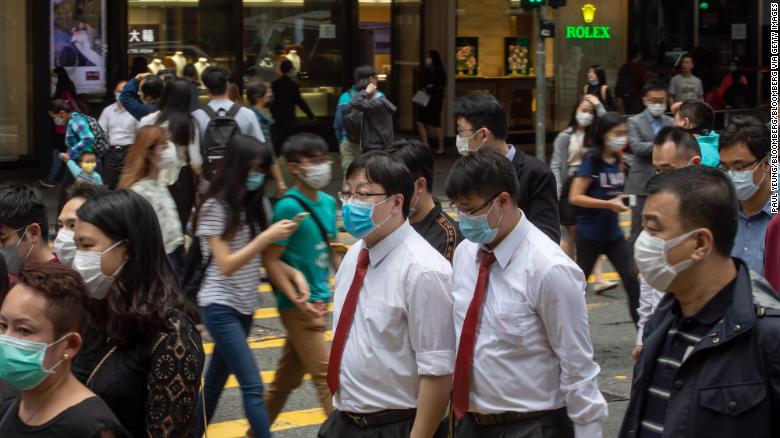- Joined
- Feb 26, 2019
- Messages
- 12,449
- Points
- 113
SCMP.COM
This Week in Asia / Opinion
How Singapore can draw the right lessons from the coronavirus crisis

Donald Low
Published: 7:00am, 16 Apr, 2020
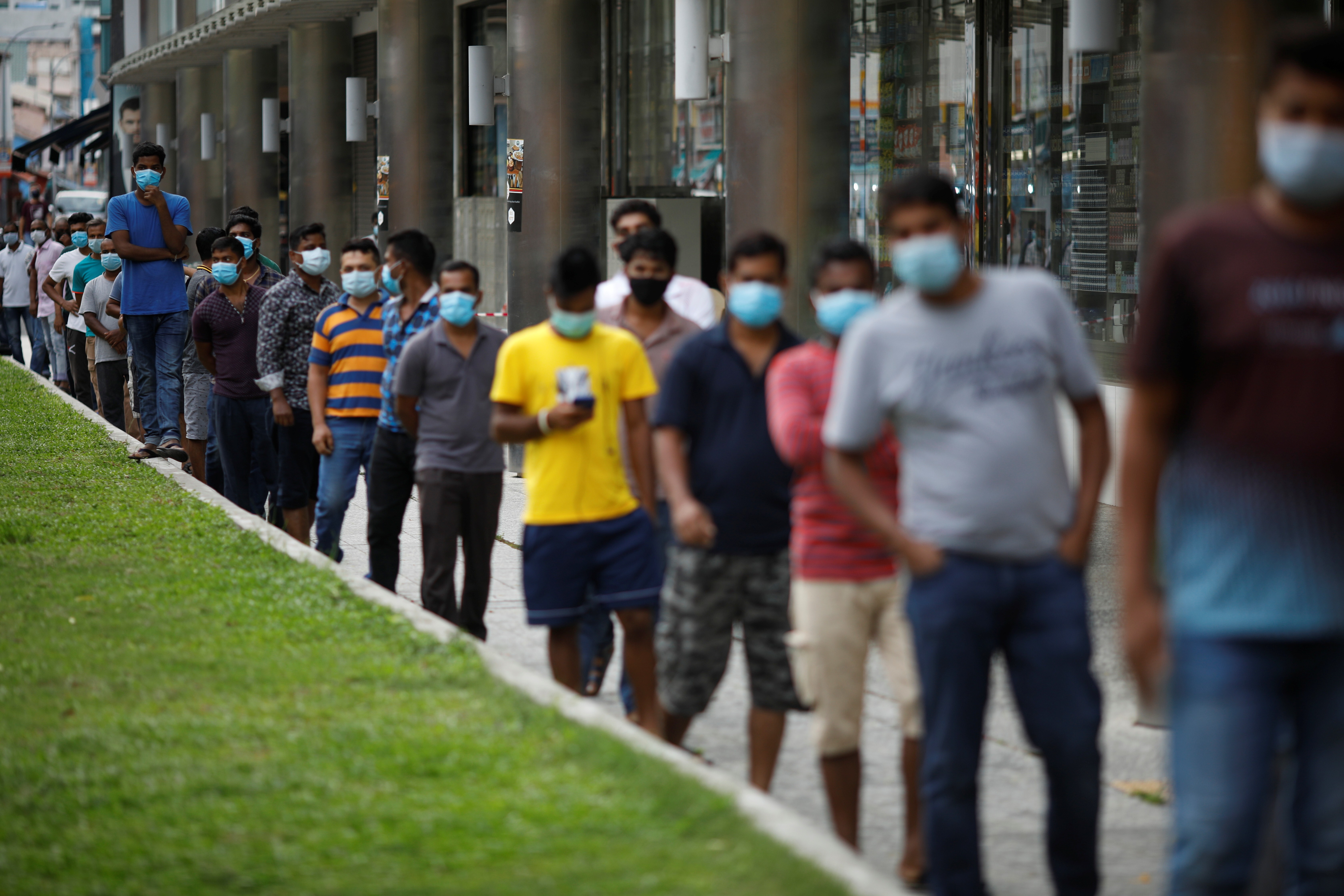
Having been holed up in a supposedly dysfunctional and badly governed
Hong Kong for almost all of the last three months, it’s been quite surreal for me to observe from afar how the usually high-performing Singapore government has struggled to suppress the spread of SARS-CoV-2, especially in the (now-quarantined) dormitories that house tens of thousands of lowly paid migrant workers. Alongside this public health crisis is an emerging political one: how much blame, if any, should the PAP government bear for the decisions that have led to the current state of affairs?
By now, it should be quite apparent that the Singaporean government made three important decisions (or non-decisions) that, with hindsight, have turned out to be mistaken.
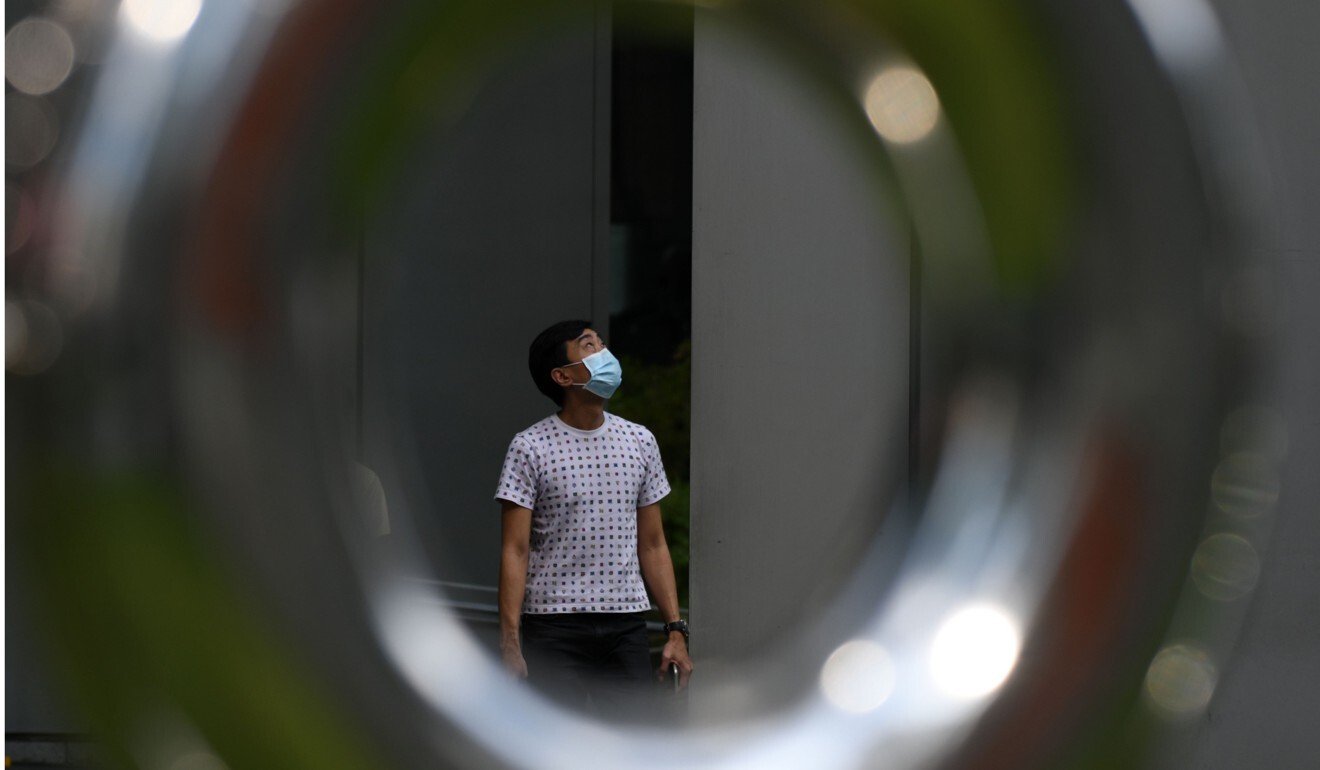
A man wearing a protective face mask walks in the Raffles Place financial business district in Singapore. Photo: AFP
The first was the initial assessment that Covid-19 was closer in severity to swine flu (or H1N1) than to Sars; this initial assessment informed the government’s decision not to close schools or introduce any of the lockdowns or shutdowns that are now (or were) in place in almost every major economy.
The second was the decision to actively discourage the wearing of masks. And the third was the decision (assuming it was a deliberate choice) not to take stronger, more decisive action in the foreign worker dormitories after a non-governmental organisation (TWC2) had highlighted earlier that given the crowded living conditions, the dormitories were a major source of vulnerability in Singapore’s containment efforts.
One of the many paradoxes in this crisis (for me at least) is that while the government should probably be blamed only for the third decision above, Singaporeans seem more eager to judge the government harshly on the first two decisions. Meanwhile, there seems to be a coordinated effort by some people to defend the way foreign workers in Singapore are treated. Attributing blame correctly, even at this stage, is important because the stories and narratives we tell ourselves now about what went wrong will inform the lessons we draw, and the policy reforms we eventually make, after the crisis.
“Known unknowns”
The first two decision errors arise from what the former US secretary of defence, Donald Rumsfeld, called “known unknowns”. These are decisions that have to be made in the absence of complete information (hence the “unknowns”); at the same time, decision makers know that they have to make a call based on limited and often imperfect information they have in real time.
On the first decision, Minister Lawrence Wong – who co-chairs the government task force set up to coordinate Singapore’s efforts to deal with Covid-19 – has said that its decision not to introduce tougher social distancing measures and other “circuit breakers” earlier were a “judgment call”, and that residents might become fatigued if such measures were implemented too soon.
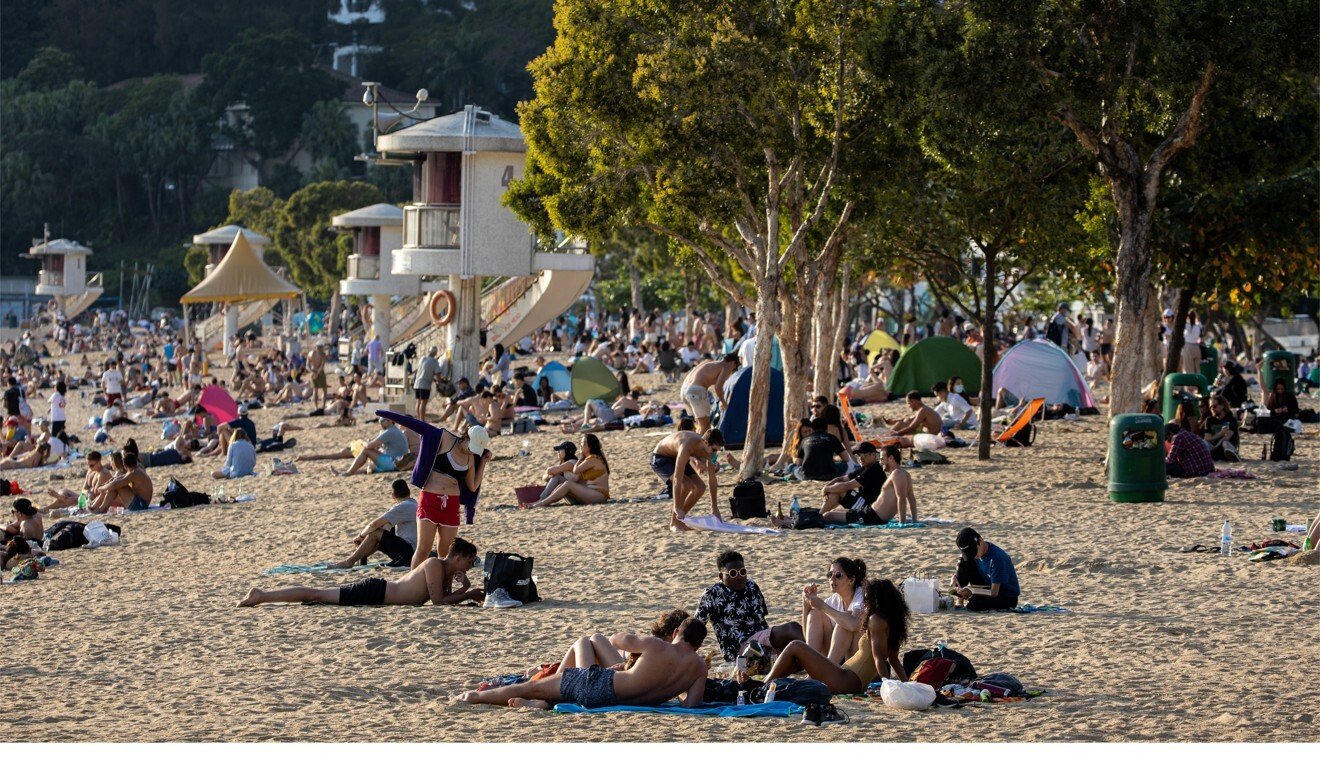
Beach goers crowd Repulse Bay beach in Hong Kong over the Easter weekend. Photo: EPA-EFE
Behavioural fatigue is quite a well-established phenomenon in psychology. Behaviourists have long contended that relying on people’s willpower might bring about short-term compliance, but cannot sustain behavioural change unless that change is routinised (i.e. it becomes a habit). While there is scope for debate and disagreement over whether social distancing and stay-at-home rules in the context of a prolonged pandemic can be sustained, this is ultimately an empirical question for which there has been very little research.
When I was interviewed by the South China Morning Postlast week for a piece it was doing on social distancing, this is what I said: “Social distancing is a big ask. After a month or so of social distancing, or working from home, not meeting friends and relatives, in the absence of replacement behaviours or replacement habits, is very tiring, and people are going to revert to their old, previous habits.”
And so it was not surprising to me that over the sunny Easter weekend, Hongkongers who have been mostly confined to their homes for more than two months showed up in large numbers at the city’s beaches and country parks
.
In any case, as Lawrence Wong says correctly, the decision was a “judgment call” made on the basis of the (best) information the government had at that point in time. Decisions should be judged not with the benefit of hindsight, but on the basis of whether they were sound or reasonable given the information decision-makers had access to when they made those decisions. During an early stage in the epidemic, the consensus among most epidemiologists and public health experts was that Covid-19 was closer to H1N1 or the seasonal flu than to Sars in terms of its severity. The latest estimates are also that the fatality rate of Covid-19 is 1-2 per cent (and probably lower if we include asymptomatic cases in the denominator), compared to about 0.1 per cent for the seasonal flu and 10 per cent for Sars. But partly because Covid-19 is mild or asymptomatic for the vast majority of the people it infects, it is also highly transmissible – far more so than the flu – as we have no herd immunity to it.
We should probably not fault or criticise the government for pursuing a policy of targeted containment in the first two months.
The unusually high transmissibility of the coronavirus is especially important because people (including experts) have a linearity bias, and we have a great deal of trouble wrapping our heads around exponential growth. To appreciate this, ask yourself this: If the number of people the virus infects increases by two times every three days, how many times do you estimate the number of cases to increase by after one month? 50 times, 100 times? The answer is more than 1,000 times (i.e. 210).
As the cliché goes, hindsight is 20/20. What this means is that we should probably not fault or criticise the government for pursuing a policy of targeted containment in the first two months to minimise economic and societal disruptions, and of eschewing lockdowns and shutdowns then. Lockdowns are also an unorthodox, draconian measure that have not been tried before by any society until this pandemic.
The same argument can also be made for the second decision to discourage Singaporeans from wearing masks unless they were not feeling well. The government had made that decision because it wanted to prioritise surgical masks for health care workers and frontline service providers. Having said that, I felt even then that it should not have been so dogmatic about the disadvantages of mask-wearing. While there is certainly the possibility that wearing masks might give people a false sense of security and deter them from doing the things that are more effective in preventing the spread of the virus – such as regular handwashing, not touching our faces, staying at home, and social distancing – this psychological effect should have been balanced against the possibility that mask-wearing “crowded in” good public health and personal hygiene behaviours.
When I was asked by the BBC’s Tessa Wong for my thoughts on mask-wearing in March 2020, I said that on balance, governments should encourage people to wear masks, not because they are a fail-safe way of protecting us from infection, but because they are a nudge for us to be (more) hygienic: “Putting on a mask every day before you go out is like a ritual, like putting on a uniform, and in ritual behaviour you feel you have to live up to what the uniform stands for, which is more hygienic behaviour like not touching your face or avoiding crowded places and social distancing.”
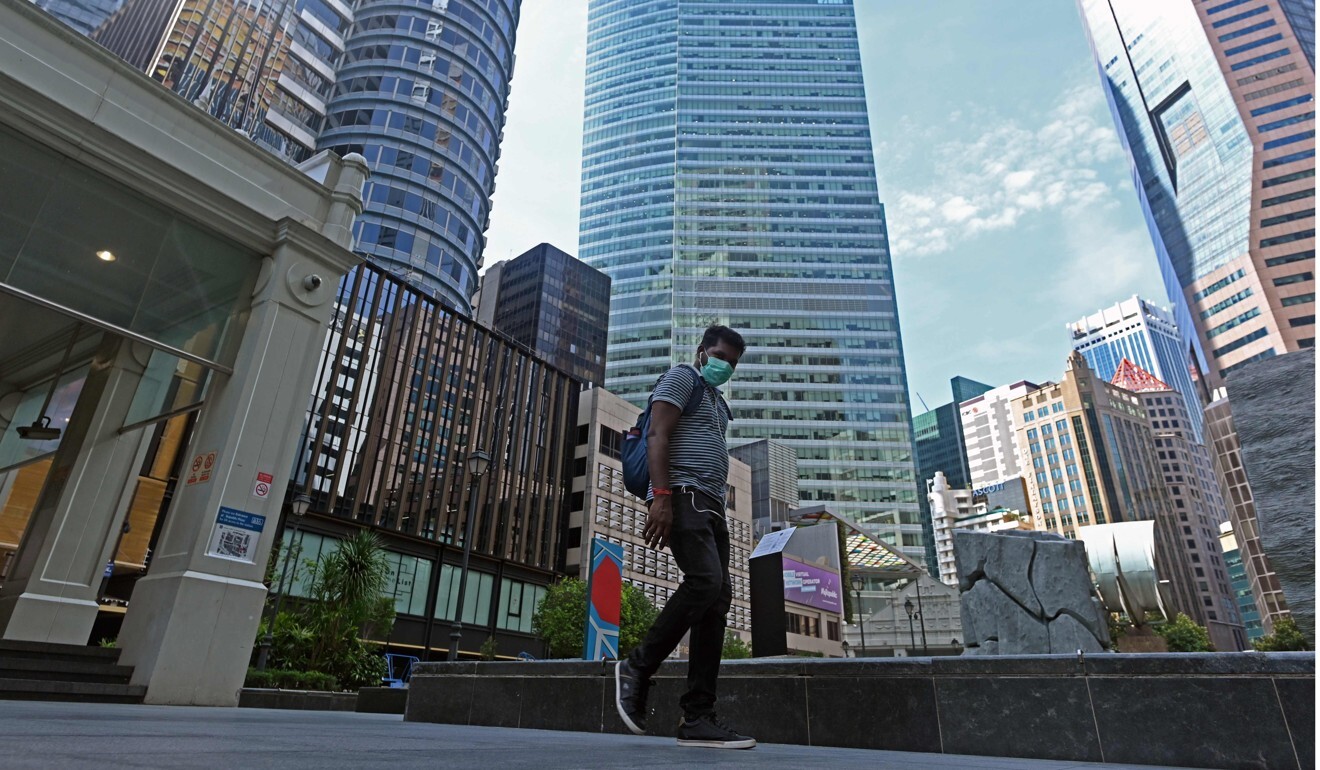
A man wears a face mask while walking in Singapore’s central business district. Photo: AFP
“Unknown knowns”
In contrast to the first two decisions that were “known unknowns”, one cannot defend the (non-) decision on foreign worker dormitories in that light. This is not something the government – or Singaporeans more generally – did not know about and which they are only now discovering. The decision not to act on TWC2’s report highlighting (again) the living conditions in the foreign workers and how they were a ticking time-bomb at the start of the pandemic reflects a mix of delusional optimism and denial. It is what Donald Rumsfeld would have called an “unknown known”: a risk or a danger that was knowable, that the government could and should have known about had it bothered to investigate. In short, it was wilful blindness or ignorance, and the government should be held to account for not acting sooner to reduce the risks of a major outbreak in the foreign worker dormitories.
But I am not optimistic that it would be held to account. Why? Because Singaporeans mostly believe that those living conditions are “good enough”. In the immediate aftermath of the virus outbreak in many of the foreign worker dormitories, social and mainstream media were dominated by voices blaming foreign workers for their own plight, saying that hygiene was a matter of personal responsibility and upbringing, and that these foreign workers came from cultures that had lower public health standards.
Besides the obvious lack of empathy, what was troubling in these responses was the failure to acknowledge basic facts. For instance, the cramped living conditions in the dormitories alone (conditions that made physical distancing impossible) would account for the rapid spread of the virus, regardless of the state of their toilets or individual hygiene habits. But this, of course, is an inconvenient fact that does not support the popular stereotype of foreign workers from South Asia being “dirty” and having lower hygiene standards.
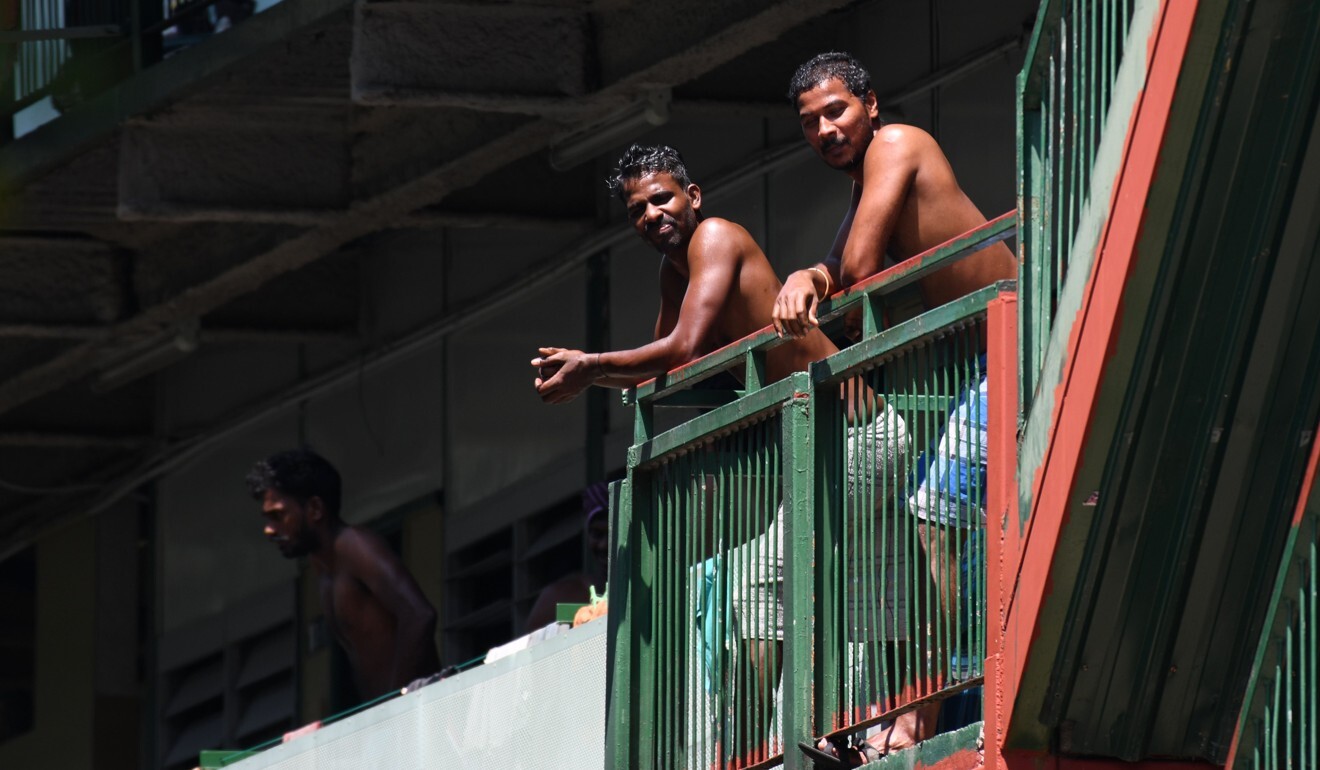
Men look out from the balcony of a dormitory used by foreign workers in Singapore. Photo: AFP
The right lessons: Diversity and Humility
I have no doubt that Singapore will survive this crisis. The number of infected cases may eventually reach several thousand, but the mortality rate should be very low. Indeed, it is because the government is (still) doing testing and contact tracing aggressively that we should expect the number of confirmed cases to increase rapidly in the coming weeks, but the case fatality rate to remain low. But we have no reason to fear. Evidence from South Korea, Germany and the Diamond Princess (the only other hard-hit places where there has been widespread testing) gives us confidence that the mortality rate would be low. Among the foreign workers, almost all of whom are young, symptoms will be mild or non-existent.
The bigger fear I have is that Singaporeans will draw the wrong lessons from this crisis. Calvin Cheng, a normally pro-government political commentator, expressed it well when he posted the following on his Facebook page recently: “If we are unlucky, the local hospital system will be overwhelmed by foreign workers. There will be nasty Singaporeans among us, who will no doubt be upset that this might mean local patients will not get the medical care they need. In the coming days, we will see some nasty things being said. This should be condemned.”
Beyond the pandemic, I hope the crisis leaves Singaporeans with two important lessons: the importance of (cognitive) diversity and humility.
At the start of the then epidemic (now pandemic), I thought the Hong Kong government’s response paled in comparison to Singapore’s “gold standard” response. Even Hong Kong people did not trust their government, certainly not after months of protests in 2019. But paradoxically, this lack of trust in the authorities was what seemed to have helped Hong Kong society to come up with their own varied responses to Covid-19. Yes, of course, the lack of trust led initially to some panic buying and hoarding (including of toilet paper!). But mask-wearing, staying at home, social distancing, and applying gentle pressure on others (especially returning expatriates) to behave hygienically – all these small but cumulatively important measures were driven from the bottom, not from the top.
Being a Singaporean who believed in the merits of a strong government, I initially thought this community response was quite unnecessary at best and panic-inducing at worst. But being a visitor here, I did not think it was my place to criticise my host society. Over time, I have come to appreciate the stoic resilience and adaptability of the Hong Kong people.
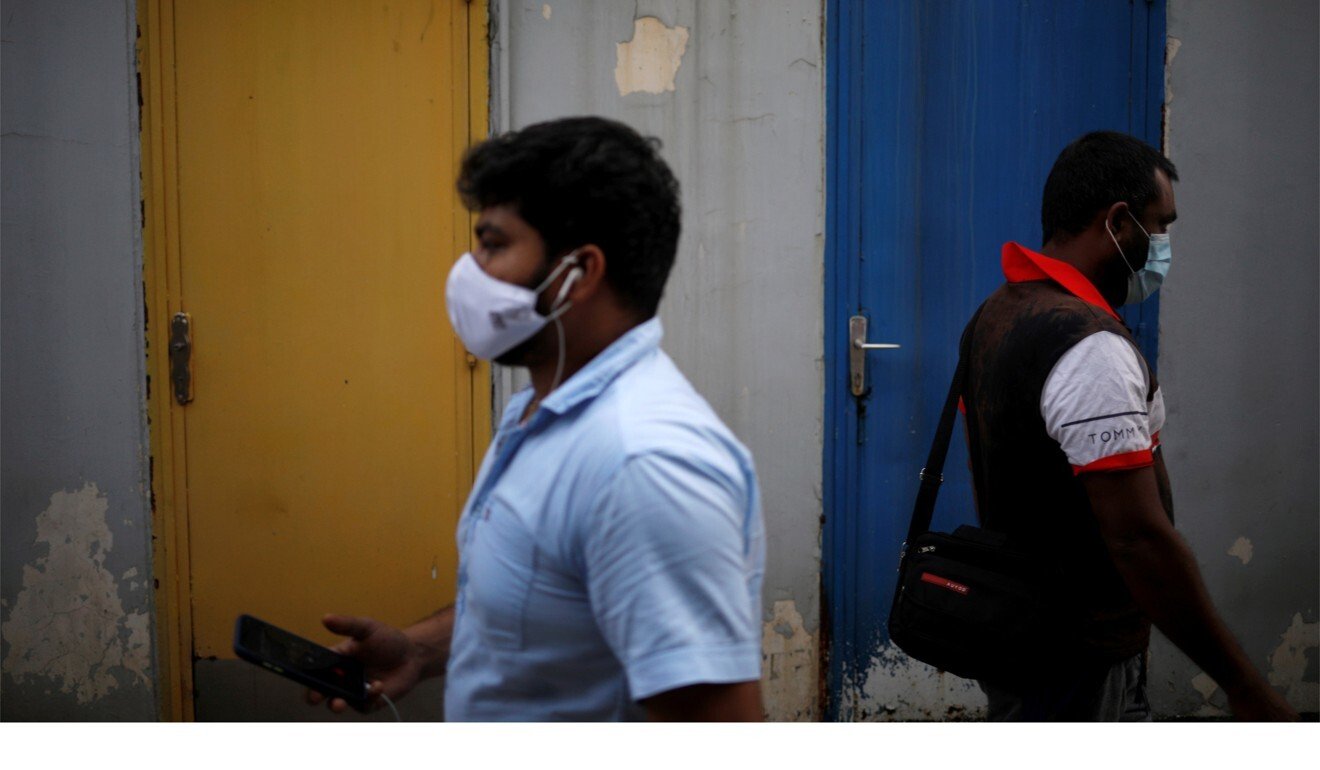
Migrant workers wearing face masks walk through Little India district in Singapore. Photo: Reuters
Singaporeans are justifiably proud of their strong, competent government; trust in government is also a valuable resource for the authorities. But it must be complemented by a strong society – one that is capable of checking, questioning, and demanding accountability from a powerful state. Between a strong, competent state and a strong society that can check and constrain the state’s excesses lies a narrow corridor that protects our rights and freedoms while allowing the state to function effectively.
Indeed, it is this productive tension and “race” between a strong state and a strong society that enable both to progress. Too much of the former and too little of the latter and that corridor shrinks, even disappears. We are then left with an all-powerful state whose mistakes and abuses are not easily checked or corrected. This is the spectre of the despotic state (which is entirely capable of performance and of generating economic growth) but which is at risk of abuses of power, while society lacks the civil and political institutions to limit those abuses and ensure accountability.
In a crisis, the biggest cognitive threat a decision-maker faces is not disunity; rather it is the tunnel vision that comes from “being in the trenches” for too long.
A strong society comes from embracing diversity: not just in terms of having people who think differently and routinely challenge received wisdoms and government decisions, but more from having the requisite institutions that check and constrain the state – civil society, Parliament, independent courts, a free media (not just one that sees its role as “nation-building”). It also means that our “unity-in-a-crisis” narrative needs to be adjusted.
The PAP government does not necessarily reject diversity and dissent, but it insists that in a crisis, the time for debate and dissent has to be suspended and that we should unite behind the authorities. Yes, but only up to a point. In a crisis, the biggest cognitive threat a decision-maker faces is not disunity; rather it is the tunnel vision that comes from “being in the trenches” for too long.
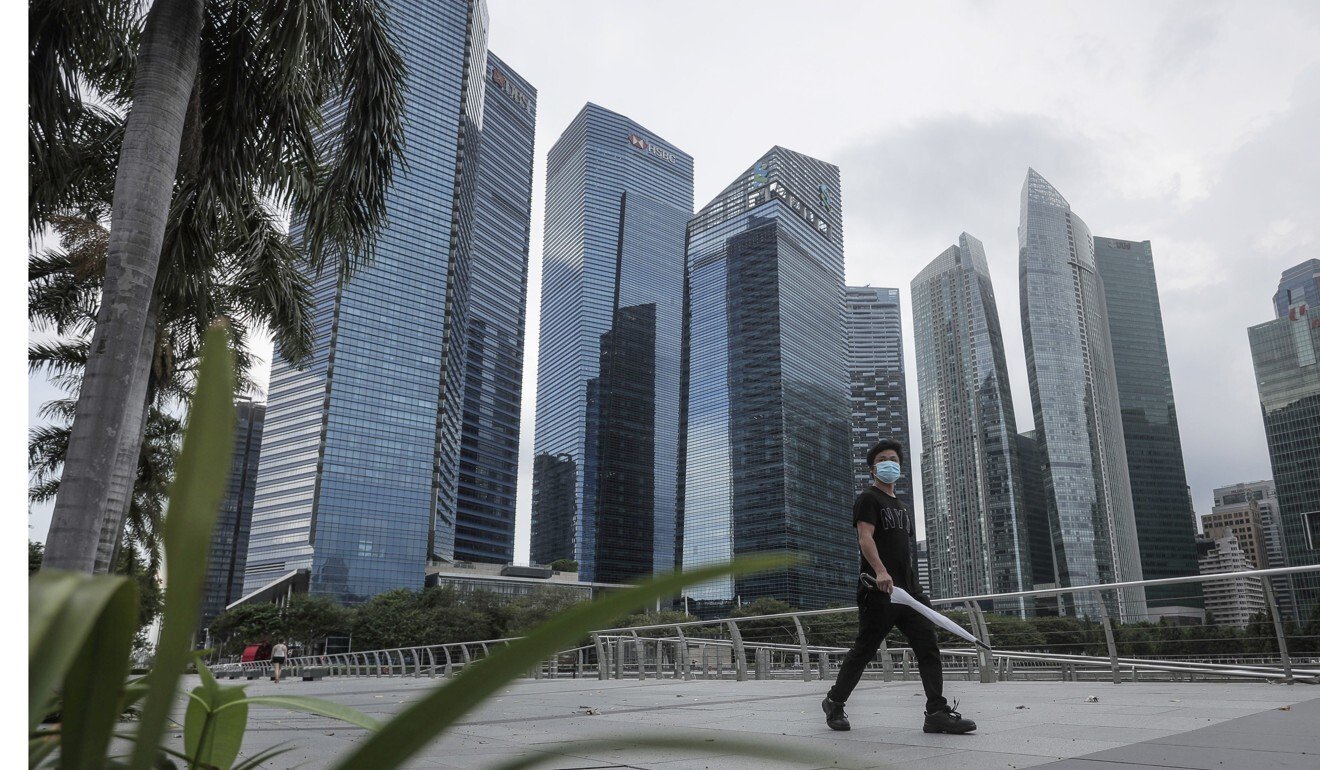
Fewer people are out in Marina Bay in Singapore. Photo: EPA-EFE
Furthermore, when confronted with a novel, unfamiliar threat which our routines and repertoires have not been designed for, it is even more important that the government embrace diversity, or at least keep an open mind about dissenting views. Whether this is over how severe this novel coronavirus would be, or if mask-wearing helps, keeping an open mind and allowing for the possibility that you may be wrong and your critics may be right gives you more room for manoeuvre, and gives you more “political space” to change directions if and when you have to. And in a rapidly evolving crisis such as this, making midcourse corrections and changing tack are almost inevitable – as we have already seen.
What is clearly not helpful is having sycophants who try to create an illusion of unanimity or unity by silencing dissent. In this particular crisis, we have seen the PAP internet brigade in its full glory: attacking dissenting voices, demonising critics, mocking other governments, and trying to enforce groupthink. Almost none of what they have done has been of value to the national effort in this crisis; it is not even clear they are helping the ruling party since they seem to appeal only to its hard core supporters.
Of course, the classic example of how a government should accommodate, even welcome, diversity and dissent even in a crisis was the Kennedy administration during the Cuban Missile Crisis. This was a crisis that lasted just under two weeks. But in that short space of time, Kennedy was able to bring on board advisers from the previous Republican administration, and consider and pursue a wide range of options (some of which failed or did not work as well as originally intended). If that degree of diversity and dissent can be accommodated in just 13 days, there is no reason this government cannot do the same in what is likely to be a chronic, prolonged crisis.
As Dr Li Wenliang said before he died, “A healthy society should not have only one voice”. The people who have been imploring the government to do more about the wretched living conditions of our foreign workers have been vindicated; we should have been listening and paying more attention to them and their suggestions. They are our Li Wenliangs, and we are stronger as a society if we would accept them as a legitimate and necessary part of our society even if we disagree with them.
When we’re dealing with a new and unfamiliar threat, we really should be a lot more circumspect about claiming superiority and criticising how other countries or societies are dealing with the threat.
The second lesson I hope Singaporeans learn from this crisis is that of humility. While I supported the government’s early assessments of the severity of Covid-19 and the need to prioritise masks for health care and frontline workers, what I found disturbing then were all these unnecessary, quite infantile and snide comments about an already beleaguered Hong Kong government and society.
In times like these, we really should not be kicking others when they’re down. My good friend, Sudhir Thomas Vadaketh, wrote a brave piece at the time, asking Singaporeans whether they should be feeling so smug at the time; it’s worth reading again.
This Week in Asia / Opinion
How Singapore can draw the right lessons from the coronavirus crisis
- The government made three important mistakes in its Covid-19 response, and attributing blame correctly will inform future decisions
- Singapore can learn lessons of diversity and humility from the crisis, and take note of the stoic resilience and adaptability of the Hong Kong people

Donald Low
Published: 7:00am, 16 Apr, 2020

Having been holed up in a supposedly dysfunctional and badly governed
Hong Kong for almost all of the last three months, it’s been quite surreal for me to observe from afar how the usually high-performing Singapore government has struggled to suppress the spread of SARS-CoV-2, especially in the (now-quarantined) dormitories that house tens of thousands of lowly paid migrant workers. Alongside this public health crisis is an emerging political one: how much blame, if any, should the PAP government bear for the decisions that have led to the current state of affairs?
By now, it should be quite apparent that the Singaporean government made three important decisions (or non-decisions) that, with hindsight, have turned out to be mistaken.

A man wearing a protective face mask walks in the Raffles Place financial business district in Singapore. Photo: AFP
The first was the initial assessment that Covid-19 was closer in severity to swine flu (or H1N1) than to Sars; this initial assessment informed the government’s decision not to close schools or introduce any of the lockdowns or shutdowns that are now (or were) in place in almost every major economy.
The second was the decision to actively discourage the wearing of masks. And the third was the decision (assuming it was a deliberate choice) not to take stronger, more decisive action in the foreign worker dormitories after a non-governmental organisation (TWC2) had highlighted earlier that given the crowded living conditions, the dormitories were a major source of vulnerability in Singapore’s containment efforts.
One of the many paradoxes in this crisis (for me at least) is that while the government should probably be blamed only for the third decision above, Singaporeans seem more eager to judge the government harshly on the first two decisions. Meanwhile, there seems to be a coordinated effort by some people to defend the way foreign workers in Singapore are treated. Attributing blame correctly, even at this stage, is important because the stories and narratives we tell ourselves now about what went wrong will inform the lessons we draw, and the policy reforms we eventually make, after the crisis.
“Known unknowns”
The first two decision errors arise from what the former US secretary of defence, Donald Rumsfeld, called “known unknowns”. These are decisions that have to be made in the absence of complete information (hence the “unknowns”); at the same time, decision makers know that they have to make a call based on limited and often imperfect information they have in real time.
On the first decision, Minister Lawrence Wong – who co-chairs the government task force set up to coordinate Singapore’s efforts to deal with Covid-19 – has said that its decision not to introduce tougher social distancing measures and other “circuit breakers” earlier were a “judgment call”, and that residents might become fatigued if such measures were implemented too soon.

Beach goers crowd Repulse Bay beach in Hong Kong over the Easter weekend. Photo: EPA-EFE
Behavioural fatigue is quite a well-established phenomenon in psychology. Behaviourists have long contended that relying on people’s willpower might bring about short-term compliance, but cannot sustain behavioural change unless that change is routinised (i.e. it becomes a habit). While there is scope for debate and disagreement over whether social distancing and stay-at-home rules in the context of a prolonged pandemic can be sustained, this is ultimately an empirical question for which there has been very little research.
When I was interviewed by the South China Morning Postlast week for a piece it was doing on social distancing, this is what I said: “Social distancing is a big ask. After a month or so of social distancing, or working from home, not meeting friends and relatives, in the absence of replacement behaviours or replacement habits, is very tiring, and people are going to revert to their old, previous habits.”
And so it was not surprising to me that over the sunny Easter weekend, Hongkongers who have been mostly confined to their homes for more than two months showed up in large numbers at the city’s beaches and country parks
.
In any case, as Lawrence Wong says correctly, the decision was a “judgment call” made on the basis of the (best) information the government had at that point in time. Decisions should be judged not with the benefit of hindsight, but on the basis of whether they were sound or reasonable given the information decision-makers had access to when they made those decisions. During an early stage in the epidemic, the consensus among most epidemiologists and public health experts was that Covid-19 was closer to H1N1 or the seasonal flu than to Sars in terms of its severity. The latest estimates are also that the fatality rate of Covid-19 is 1-2 per cent (and probably lower if we include asymptomatic cases in the denominator), compared to about 0.1 per cent for the seasonal flu and 10 per cent for Sars. But partly because Covid-19 is mild or asymptomatic for the vast majority of the people it infects, it is also highly transmissible – far more so than the flu – as we have no herd immunity to it.
We should probably not fault or criticise the government for pursuing a policy of targeted containment in the first two months.
The unusually high transmissibility of the coronavirus is especially important because people (including experts) have a linearity bias, and we have a great deal of trouble wrapping our heads around exponential growth. To appreciate this, ask yourself this: If the number of people the virus infects increases by two times every three days, how many times do you estimate the number of cases to increase by after one month? 50 times, 100 times? The answer is more than 1,000 times (i.e. 210).
As the cliché goes, hindsight is 20/20. What this means is that we should probably not fault or criticise the government for pursuing a policy of targeted containment in the first two months to minimise economic and societal disruptions, and of eschewing lockdowns and shutdowns then. Lockdowns are also an unorthodox, draconian measure that have not been tried before by any society until this pandemic.
The same argument can also be made for the second decision to discourage Singaporeans from wearing masks unless they were not feeling well. The government had made that decision because it wanted to prioritise surgical masks for health care workers and frontline service providers. Having said that, I felt even then that it should not have been so dogmatic about the disadvantages of mask-wearing. While there is certainly the possibility that wearing masks might give people a false sense of security and deter them from doing the things that are more effective in preventing the spread of the virus – such as regular handwashing, not touching our faces, staying at home, and social distancing – this psychological effect should have been balanced against the possibility that mask-wearing “crowded in” good public health and personal hygiene behaviours.
When I was asked by the BBC’s Tessa Wong for my thoughts on mask-wearing in March 2020, I said that on balance, governments should encourage people to wear masks, not because they are a fail-safe way of protecting us from infection, but because they are a nudge for us to be (more) hygienic: “Putting on a mask every day before you go out is like a ritual, like putting on a uniform, and in ritual behaviour you feel you have to live up to what the uniform stands for, which is more hygienic behaviour like not touching your face or avoiding crowded places and social distancing.”

A man wears a face mask while walking in Singapore’s central business district. Photo: AFP
“Unknown knowns”
In contrast to the first two decisions that were “known unknowns”, one cannot defend the (non-) decision on foreign worker dormitories in that light. This is not something the government – or Singaporeans more generally – did not know about and which they are only now discovering. The decision not to act on TWC2’s report highlighting (again) the living conditions in the foreign workers and how they were a ticking time-bomb at the start of the pandemic reflects a mix of delusional optimism and denial. It is what Donald Rumsfeld would have called an “unknown known”: a risk or a danger that was knowable, that the government could and should have known about had it bothered to investigate. In short, it was wilful blindness or ignorance, and the government should be held to account for not acting sooner to reduce the risks of a major outbreak in the foreign worker dormitories.
But I am not optimistic that it would be held to account. Why? Because Singaporeans mostly believe that those living conditions are “good enough”. In the immediate aftermath of the virus outbreak in many of the foreign worker dormitories, social and mainstream media were dominated by voices blaming foreign workers for their own plight, saying that hygiene was a matter of personal responsibility and upbringing, and that these foreign workers came from cultures that had lower public health standards.
Besides the obvious lack of empathy, what was troubling in these responses was the failure to acknowledge basic facts. For instance, the cramped living conditions in the dormitories alone (conditions that made physical distancing impossible) would account for the rapid spread of the virus, regardless of the state of their toilets or individual hygiene habits. But this, of course, is an inconvenient fact that does not support the popular stereotype of foreign workers from South Asia being “dirty” and having lower hygiene standards.

Men look out from the balcony of a dormitory used by foreign workers in Singapore. Photo: AFP
The right lessons: Diversity and Humility
I have no doubt that Singapore will survive this crisis. The number of infected cases may eventually reach several thousand, but the mortality rate should be very low. Indeed, it is because the government is (still) doing testing and contact tracing aggressively that we should expect the number of confirmed cases to increase rapidly in the coming weeks, but the case fatality rate to remain low. But we have no reason to fear. Evidence from South Korea, Germany and the Diamond Princess (the only other hard-hit places where there has been widespread testing) gives us confidence that the mortality rate would be low. Among the foreign workers, almost all of whom are young, symptoms will be mild or non-existent.
The bigger fear I have is that Singaporeans will draw the wrong lessons from this crisis. Calvin Cheng, a normally pro-government political commentator, expressed it well when he posted the following on his Facebook page recently: “If we are unlucky, the local hospital system will be overwhelmed by foreign workers. There will be nasty Singaporeans among us, who will no doubt be upset that this might mean local patients will not get the medical care they need. In the coming days, we will see some nasty things being said. This should be condemned.”
Beyond the pandemic, I hope the crisis leaves Singaporeans with two important lessons: the importance of (cognitive) diversity and humility.
At the start of the then epidemic (now pandemic), I thought the Hong Kong government’s response paled in comparison to Singapore’s “gold standard” response. Even Hong Kong people did not trust their government, certainly not after months of protests in 2019. But paradoxically, this lack of trust in the authorities was what seemed to have helped Hong Kong society to come up with their own varied responses to Covid-19. Yes, of course, the lack of trust led initially to some panic buying and hoarding (including of toilet paper!). But mask-wearing, staying at home, social distancing, and applying gentle pressure on others (especially returning expatriates) to behave hygienically – all these small but cumulatively important measures were driven from the bottom, not from the top.
Being a Singaporean who believed in the merits of a strong government, I initially thought this community response was quite unnecessary at best and panic-inducing at worst. But being a visitor here, I did not think it was my place to criticise my host society. Over time, I have come to appreciate the stoic resilience and adaptability of the Hong Kong people.

Migrant workers wearing face masks walk through Little India district in Singapore. Photo: Reuters
Singaporeans are justifiably proud of their strong, competent government; trust in government is also a valuable resource for the authorities. But it must be complemented by a strong society – one that is capable of checking, questioning, and demanding accountability from a powerful state. Between a strong, competent state and a strong society that can check and constrain the state’s excesses lies a narrow corridor that protects our rights and freedoms while allowing the state to function effectively.
Indeed, it is this productive tension and “race” between a strong state and a strong society that enable both to progress. Too much of the former and too little of the latter and that corridor shrinks, even disappears. We are then left with an all-powerful state whose mistakes and abuses are not easily checked or corrected. This is the spectre of the despotic state (which is entirely capable of performance and of generating economic growth) but which is at risk of abuses of power, while society lacks the civil and political institutions to limit those abuses and ensure accountability.
In a crisis, the biggest cognitive threat a decision-maker faces is not disunity; rather it is the tunnel vision that comes from “being in the trenches” for too long.
A strong society comes from embracing diversity: not just in terms of having people who think differently and routinely challenge received wisdoms and government decisions, but more from having the requisite institutions that check and constrain the state – civil society, Parliament, independent courts, a free media (not just one that sees its role as “nation-building”). It also means that our “unity-in-a-crisis” narrative needs to be adjusted.
The PAP government does not necessarily reject diversity and dissent, but it insists that in a crisis, the time for debate and dissent has to be suspended and that we should unite behind the authorities. Yes, but only up to a point. In a crisis, the biggest cognitive threat a decision-maker faces is not disunity; rather it is the tunnel vision that comes from “being in the trenches” for too long.

Fewer people are out in Marina Bay in Singapore. Photo: EPA-EFE
Furthermore, when confronted with a novel, unfamiliar threat which our routines and repertoires have not been designed for, it is even more important that the government embrace diversity, or at least keep an open mind about dissenting views. Whether this is over how severe this novel coronavirus would be, or if mask-wearing helps, keeping an open mind and allowing for the possibility that you may be wrong and your critics may be right gives you more room for manoeuvre, and gives you more “political space” to change directions if and when you have to. And in a rapidly evolving crisis such as this, making midcourse corrections and changing tack are almost inevitable – as we have already seen.
What is clearly not helpful is having sycophants who try to create an illusion of unanimity or unity by silencing dissent. In this particular crisis, we have seen the PAP internet brigade in its full glory: attacking dissenting voices, demonising critics, mocking other governments, and trying to enforce groupthink. Almost none of what they have done has been of value to the national effort in this crisis; it is not even clear they are helping the ruling party since they seem to appeal only to its hard core supporters.
Of course, the classic example of how a government should accommodate, even welcome, diversity and dissent even in a crisis was the Kennedy administration during the Cuban Missile Crisis. This was a crisis that lasted just under two weeks. But in that short space of time, Kennedy was able to bring on board advisers from the previous Republican administration, and consider and pursue a wide range of options (some of which failed or did not work as well as originally intended). If that degree of diversity and dissent can be accommodated in just 13 days, there is no reason this government cannot do the same in what is likely to be a chronic, prolonged crisis.
As Dr Li Wenliang said before he died, “A healthy society should not have only one voice”. The people who have been imploring the government to do more about the wretched living conditions of our foreign workers have been vindicated; we should have been listening and paying more attention to them and their suggestions. They are our Li Wenliangs, and we are stronger as a society if we would accept them as a legitimate and necessary part of our society even if we disagree with them.
When we’re dealing with a new and unfamiliar threat, we really should be a lot more circumspect about claiming superiority and criticising how other countries or societies are dealing with the threat.
The second lesson I hope Singaporeans learn from this crisis is that of humility. While I supported the government’s early assessments of the severity of Covid-19 and the need to prioritise masks for health care and frontline workers, what I found disturbing then were all these unnecessary, quite infantile and snide comments about an already beleaguered Hong Kong government and society.
In times like these, we really should not be kicking others when they’re down. My good friend, Sudhir Thomas Vadaketh, wrote a brave piece at the time, asking Singaporeans whether they should be feeling so smug at the time; it’s worth reading again.

